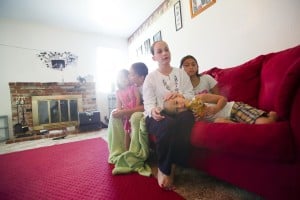
Cambodian women vendors sit in the middle of their produce at a street market. Be wary of street food. Photograph by: Tang Chhin Sothy
A little technology - and duct tape - goes a long way for 50-something couple who backpacked five countries
By Edward Yatscoff,
For Postmedia News
July 30, 2011
Flashpacker (def): Flashpacking is a trend among travellers who share the backpacking ethos. Someone, usually in their mid-20s to early-30s, who travels like a backpacker but has more disposable income; also uses electronics on the road, e.g., iPod or laptop; expects better accommodation and more amenities; seeks to explore the world but not give up comforts. Flashpacking is backpacking for the 21st century.
Except for our ages - my wife Gloria and I are in our late 50s - this description probably applies to us. Our long-awaited trip after retiring, intended to flee a good chunk of winter, finally came down to deciding where to go. Picking the brains of recent travellers and doing plenty of online research, we concluded Southeast Asia was our best bet.
People our age consider winging it through five countries an example of adventure travel. After a 32year career with Edmonton Fire Rescue, I didn't want extreme adventure. Gloria would take it in small doses.
Everyone asked if we would be on a tour. Tours are expensive and too regimented for us. They do have advantages, but being on a leash doesn't appeal to us. Finding a piece of paradise and having to abandon it in an hour can be very disappointing.
Winging it has plenty of logistical challenges and self-reliance is paramount. Our have-to stops were a few UNESCO World Heritage sites, including Angkor Wat, Halong Bay and China's Great Wall. Our lazy, unstructured itinerary left plenty of time at each and in between.
Most challenging was packing efficiently. With only one medium suitcase each, we fretted over what, or what not, to take. That turned out to be a total time-waster.
Clothes are everywhere and cheap in the markets in Cambodia and Vietnam. International companies have large factories there and the irregulars/seconds are dumped locally. They'll also tailor any type of outfit and ship it home for you. For $110, you can get a made-toorder silk suit in one day.
Usually when we travel, we book ahead only for the first night or two of accommodation. If we like a place, we'll stay - if not, we saddle up. Hotel photos can be very creative.
We took a laptop and it was invaluable: for banking; as an alarm clock; checking e-mail and weather; searching for accommodation and sights; updating ourselves on travel warnings and scams; and as a telephone to talk, using Skype, with our children regularly. We also bought landline time from Skype.
Many eateries, cafes, and just about all hotels/guest houses have free Wi-Fi, sometimes with a shared computer in the lobby. Dedicated Internet places offer Skype, photocopying, printing and CD burning. Bank-account passwords and passport copies were uploaded to a server and saved in an e-mail. Internet maps provided locations of train and bus stations. If we got lost, we'd simply hop in a cab.
Only two types of plug-in converters were necessary for China, Korea, Cambodia, Vietnam and Laos. Both had two cylindrical prongs, with one device smaller than the other. As they say in Southeast Asia: "same, same, but different."
English books can be found in scattered bookstores or hotel book swaps. Books take up space so an e-book reader was the way to go. It's small and can download stories in seconds with a decent Wi-Fi signal.
We got our first entry visa online direct from the Cambodian embassy. The remainder were applied for on the fly at foreign embassies. It's cheaper and faster - except for China; the slowest at four days. They squeeze time-constrained tourists by steering them to an "express" option at double the cost.
Avoid visa-on-arrival letters. Pay close attention to visa time limits, as some begin upon entry and others begin as soon as you receive them. The bar code on our Cambodian entry visa didn't print out at home and caused some concern at the Phnom Penh airport.
But they love tourists there and let me use their immigration computer. ASEAN countries are presently ironing out a unified "one visa."
Do bring duct tape, laundry bar soap and a length of clothesline to hang out wet clothing, although your laundry can be done for a dollar or two per kilogram.
We took U.S. cash and Amex traveller's cheques, which are useless to a thief. It's a chore trying to cash them, however, because it requires a passport. We kept our passports and cash bagged in small packets and carried them with us most of the time. Other times we stowed valuables in a vault in the room or at the hotel desk, wrapped in a bag and ducttaped.
My debit card wouldn't fit into a few ATMs in Vietnam and Cambodia, while others accepted it; however, you get a better rate for U.S. cash. Visa is not widely accepted at smaller hotels, so booking online as you go works well.
Don't worry about being homeless for a night, as there are more hotels off the grid than on. The farther away you venture from touristy areas, the more you'll need local currency.
Our budget was $50 to $60 per day or under $2,000 per month (food and accommodation with some transportation). We based it on $20 to $30 hotel rooms, with a flush toilet, private washroom, and pool. For the most part, we stayed within the budget; often below it.
Many young backpackers stay at $3-a-night-and-up guest houses. If you choose to live large, a budget of $60 to $100 per day will certainly do it.
Cabs and tuk-tuks (motorcycles pulling a four-seater cart) in Asia are cheap transport.
Hiring one for the day is worthwhile, but you'll have to be a savvy negotiator. It helps to look at a city map before you arrive anywhere.
Don't buy tours or tickets on the street. Hotels and guest houses, along with travel agents, are your best option for travel/tour tickets, as they'll save you time and legwork - and you'll have someone to yell at if your trip goes sour.
In Cambodia, if you book a room ahead, someone will meet you at the bus station, holding up a VIP sign with your misspelled name. It's hilarious.
Vietnamese National Railways filled up faster than we expected. Rail-car seating is a maze of options: hard seats, soft seats, suites, first class, A/C, sleepers, slow vs. fast trains, etc. Call in the travel agent on that one.
In Cambodia, use the Mekong Express: good Japanese buses, a stewardess, free pastries, moist towelettes, karaoke music videos, and employees who gleefully wave as you leave the terminal. A competitor bus company we used once broke down, requiring us to stand in the heat for an hour. But that's Asia. Everyone accepts these things. Perseverance is compulsory here.
English is prevalent in many places in varying degrees. Not as much in China. Expect to occasionally pantomime what you need, and carry a "quick guide" of words in the local language. The locals appreciated our attempts to communicate. Hello, goodbye and thank you saw us through.
Checking English-language websites of local newspapers kept us apprised of events and weather. While in Asia, 12 people drowned when a tour boat sank in Halong Bay and the tsunami hit Japan.
It made us wary of the cheapest tours.
We spent a lot of time cruising riversides and seashores. It seems that even the poorest towns in Asia have improved theirs, turning them into vibrant gathering places.
Booking transport and rooms too far ahead resulted in us missing a few events. But that's winging it.
Do research on local festivals and events, and try to time your trip to them.
Our biggest decision was where and what to eat, and discussing options for our next move. Cambodian, Lao and Vietnamese menus are similar, hence, "same, same, but different." Patrons can linger at eateries for long periods, as the owners like having bodies at tables to attract passersby.
Fruit here is plentiful and cheap and we ate it for nearly all our lunches. Bring a thin cutting board and sharp knife. Although we ate some street food, we didn't get sick, crediting a combination of Dukoral medication, food wariness, chilies and luck. No salads, uncooked meals, smoothies with crushed ice, or ice-cube drinks.
Definitely no tap water. After eating at one busy place, we happened to see the dishwashing area and figured we'd be laid up. People told us if we happened to get seriously hurt or sick, to go directly to Thailand. Do not pass go.
Five countries were a bit much, as the many currency conversions and languages overlapped in our heads and at times became confusing. We should have spent more time on the Cambodian coast and less in northern Vietnam, as somewhat cooler temperatures there in February and March surprised us.
At no time did we feel threatened or unsafe. Locals were accommodating and friendly and older people are generally accorded more respect. We underestimated the trek on the Janshanling section of the Great Wall. It was a tough haul, but we did it.
The sights, sounds and smells in Southeast Asia can almost be overwhelming, akin to being dropped onto another planet.
Riding in an open tuk-tuk is almost magical. Pungent frangipane scents mix with exhaust, charcoal cooking fires, incense and the odd whiff of fish and sewage. It's a heady mix.
Small children and extended families create lively street scenes and are present in almost every business.
Their world is public and much work is still done on the sidewalks, from moto repair to haircuts to barbecuing entire hogs.
The really good news was that beer is still a buck, and even cheaper in some places. Deja vus all over again.
The bad news is coming home and having to cook again. There were a lot more people there our age and older winging it. All it takes is a bit more effort.
If You Go
Here are some helpful websites if you are planning a trip to Southeast Asia: Talesofasia.com, Agoda. com, travelfish.org, Tripadvisor. com, asiarooms.com and Foreign Affairs Canada at international. gc.ca/international/index.aspx.
















